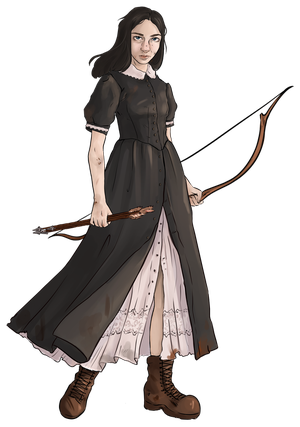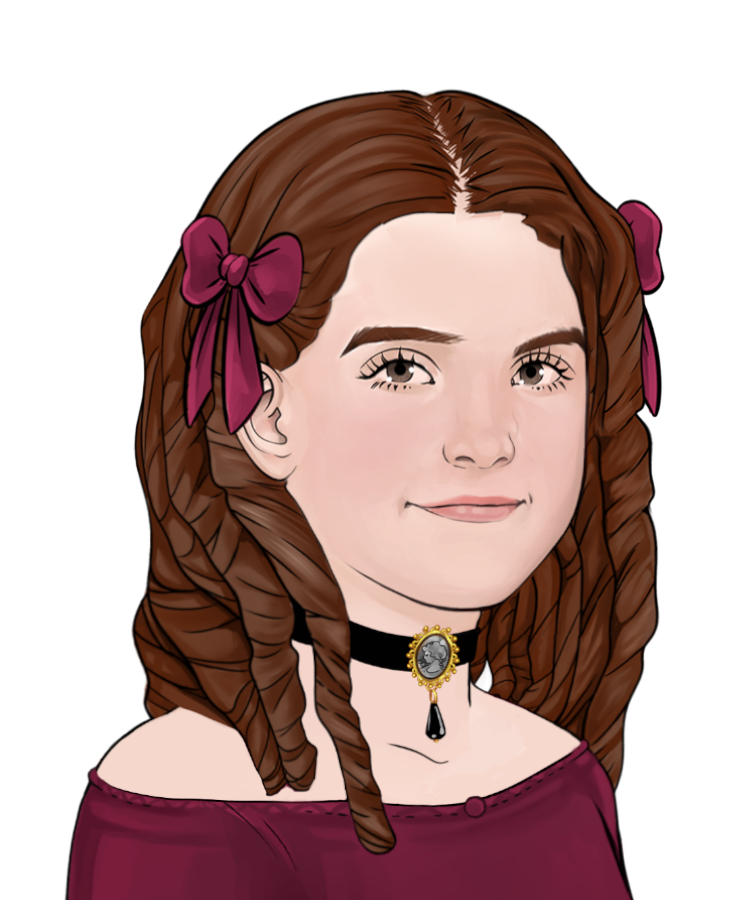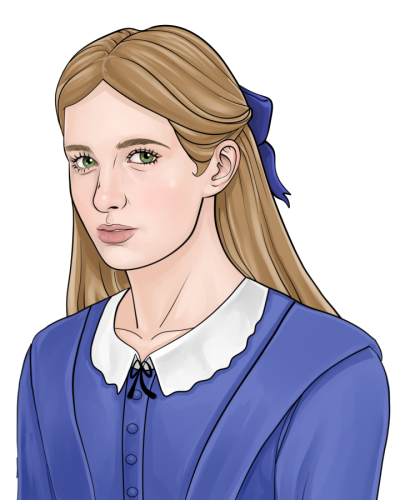The Wolf of Cape Ann

This is a diary entry from The Salt Island Diaries
Tuesday, 6 July 1847

Our summer adventure is finally arrived! To-day Mr. MacAndrew called, not to deliver firewood, the product of much more irregular growth: workhouse girls. Mr. MacAndrew’s new business scheme put him in the company of a lady from the Unitarian church, which somehow raised no eyebrows.
I was the first to greet them on the lawn before the house. The selection remaining in the back of their wagon was slim, indeed. When Mama and Clara arrived to talk to them, I crept past the horses to get a look at their last remaining passenger. She was haggardly in every way. Unkempt dark hair partially obscured a pale face and dark blue eyes. Her faded workhouse dress was dirty and frayed, yet adorned with the latest Texan fashion accessories: a metal waist-belt, through which was threaded a short chain to iron wrist cuffs.
I overheard that this girl was none other than the “Wolf of Cape Ann.” Last summer, homesteads on the coast around Rockport were terrorized by unrelenting raids on barn and garden, presumably by a real wolf. There was no way to know which farm would be next, as each raid occurred far from the last. Boys, put on watch with rifles, could not see and could not hear the quick movements in the darkness around them. Guard dogs abandoned their duties to await their masters in Heaven, apparently making the journey by means of a sandwich, for their bodies were never found. When one particular raid included the removal of a girl’s dress from a laundry line, the experts were stunned: Massachusetts wolves were not known to fancy the high hemlines common to girls’ dresses.
The girl sat very still and pretended not to notice me. Before long, she was unlocked from the wagon and was brought forcibly by the chain, which, after being unthreaded from the side rail, was left attached to only one wrist. There, she was presented to Mama as a distant relation of papa’s. She looked at Mama silently with wolf eyes. Mama asked, “Does she not speak?”
“We asked the same at the workhouse,” said the lady. She held up the girl’s chained arm. The girl promptly offered bitter resistance, which gave Mr. MacAndrew great occupation. Once manually convinced, the girl revealed to us a badly scarred forearm, the result of either cutting or burning, and many scars seemed to be insults to earlier handiwork. The church lady said with disgust, “She can be made to speak.”
“If she had to be chained for transport, how could she have been made to stay in the workhouse?” asked Mama.
“She was chained to a sewing table and given food in exchange for piece work,” replied the church lady.
“For six months?” When Mama is displeased, she inhales, and as she is a great swimmer, her dress top is always stretched to its limit, and in these moments, she threatens to burst out of all propriety, and to undo without circumspection the instrument of her annoyance. This must give every human pause, but it caused the wolf-girl to take flight, chains and all.
Mr. MacAndrew assured us that the noise and encumbrance of the chains would facilitate her recapture, should she return to-night to make dinner for herself in the barn. Mama was unable to express gratitude for the charity of the Unitarian church.
Clara and I were, of course, deliriously excited about the promise of high adventure such a wild girl does make to all those who would have to do with her. We watched her from the north cliff, as she combed the beach below in search of food. Using our formidable powers of deduction, we were able to reconstruct her entire criminal career, including the killing of wild animals, and of humans, who were unfortunate enough to happen upon her dancing naked about freshly killed prey.
Tuesday, 6 July 1847
Same Day

To-day, Mr. MacAndrew came to the cliff-house out of season, and the reason was the delivery of a girl from the almshouse. He was accompanied by Mrs. Nash, also a Unitarian Church member and tiresome abolitionist.
Mama and I came out to meet them on the lawn. The workhouse girl, whose name we were to be told was Ophelie, was not disposed to participate in the conversation. Mrs. Nash explained that this was the very “Wolf of Cape Ann,” about whom we heard so much last year. We learned to-day that the girl’s parents were taken by consumption last spring near Essex, leaving four children to fend for themselves. Ophelie was the only survivor. She had the cunning to set up a camp for herself hidden in the forest of the cape, and from her lair, conducted raids on the hen-houses and gardens of homesteads on the coasts. This, she did during the warm weather of last year. Finally, a committee of concerned citizens was formed to advise her enterprise. When her hideout was discovered, a trap was set for her.
Because Gloucester has no women’s prison, she was obliged to serve her sentence in the almshouse, of which she is to-day quit. The love of our Lord inspired Mrs. Nash to inquire in the villages of the cape until she discovered Ophelie’s likely name and origins. We are the first to learn of Mrs. Nash’s research; she would not reveal to the courts that Ophelie stands to inherit her family’s farm, for fear that it should have been fined away from her. “It is not meet,” she said, “that a fourteen-year-old girl should be expected to operate a farm on her own, and failing that, punished for the impertinence of survival.”
Mama listened patiently, even with interest, but at last asked why we had been made privy to the secret. Mrs. Nash said that she could freely confide in the girl’s family! According to Mrs. Nash, Ophelie is the daughter of a second cousin, or some such tale that wore at Mama’s patience. She bade them return when Papa should be back from sea. She could not be called upon to make a decision about kin not her own.
While this was being spoken, Mr. MacAndrew brought the girl forward, as though she were a cute puppy not to be refused. However, to be honestly said, her cute days, if she ever had any, were already behind her. After living in the forest, and subsequently, gaols and workhouse, she had lost her girlhood, and her womanhood was too shocked and offended to receive her. Nevertheless, we were (at least I was) struck by her dark hair and piercing, dark blue eyes. She seemed a more likely relation of Mama than of Papa. All observers grew apprehensive, as the two female creatures silently stared at each other, for too long.
“Can the girl not speak?” Mama finally asked in wonder.
Mrs. Nash implied that Ophelie had been roughly used by humans, and had thereby lost all solidarity with the guilty species.
Mama then asked why she was chained, and the answer was that it was the only means of keeping her from leaping off the wagon. Then how in the world was she confined to the almshouse, whose door in day-time is left open? Answer: Ophelie was chained to the sewing table at which she worked for food scraps. Mama was clearly infuriated, and Ophelie, mistakenly sensing the onset of another beating, broke out of Mr. MacAndrew’s grasp and fled down the hill.
Mr. MacAndrew shrugged. He seemed to have expected her flight, at least upon being unshackled. “If she returns to her old haunts,” he said, “she shall be in Boston’s women’s penitentiary by summer’s end. If she stays in the area, you’ll serve yourselves best by locking your barn and lying in wait for her to-night.”
“I cannot thank you for this adventure,” said Mama, “nor for your visit.” She returned to the house without any further gesture of civility.
Ophelie spent the rest of the afternoon on Sand Beach and the salt marsh behind it, clamming and looking under rocks for anything edible. Birdie and I crouched unseen on the cliff-top to watch her. Mama’s tall and powerful form appeared in her bedroom window, from which she could survey the shore below. At that moment, Ophelie raised her head, as though she’d heard or smelled something that might signal the approach of misadventure.
